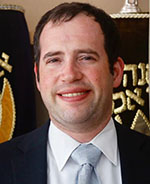By Rabbi Ben Herman

MIAMI, Florida — There are some things for which there are no words. On Thursday I did two funerals where I spoke about why we thank God at times of tragedy-because when we feel vulnerable, that the world has slipped out from underneath our footsteps, we need to find some rock to anchor ourselves, and that rock with a capital R is God. However, how can we thank God in the midst of a tragedy: the structural collapse of the Champlain Towers South Building? How can we be thankful when people are missing and all that might remain of them are DNA traces under the rubble? How can we be grateful when so many don’t know if their loved ones are alive or dead?
Unlike in my lengthy Israel sermon last week, this week I have very little to say. A presumed 153 victims in the middle of the night, unaware that the ground beneath their feet was crumbling. A community that I best knew for its kosher scene, especially Mendel’s Backyard BBQ, now in one of the most gripping, horrific and terrible tragedies our country has ever seen.
In an emergency rabbi meeting on Thursday evening, Rabbi Jonathan Berkun spoke about the importance of being present at these moments. He had flown out to Pittsburgh where his father, Alvin Berkun, served as rabbi of Tree of Life Congregation. He was at Surfside Thursday along with Rabbi Fred Klein and countless others, seeing what they could do in a pastoral role. I was at Surfside after Sunday minyan. The 17th of Tammuz is the date on which we remember the beginning of the end of the Second Temple, with the Romans breaking through the walls of Jerusalem. It was an appropriate day to respond pastorally to those who have undergone such a horrific tragedy-the destruction of their homes or the homes of their loved ones.
In times of trauma, all one can do is listen and be present. In Surfside I went to the Family Relocation Center, where I saw scores of displaced families as well as volunteers giving out goods. I went to the Grand Beach Hotel in Surfside, spending time with numerous Christian and Jewish volunteers who were giving out food to the families staying there. I also prayed Mincha at The Shul in Bal Harbor and heard speeches from Rabbi Lasker, as well as our new Consul General from Israel as well as Israel’s Minister for Diaspora Affairs. Just as it was my job as a rabbi to be in Israel after trauma so too it was and continues to be my job to be at Surfside without an agenda, just to see who needs a listening ear. It is our job to help however we can. The Greater Miami Jewish Federation has a centralized fund for which they will use the monies collected to help meet the specific needs of those who lost their homes.
I pray for those affected by this traumatic tragedy and that I can do my small part to attend to their needs. Often people have good intentions but don’t respond in the way most needed. Sometimes all that is needed is to be present and listen to one person rather than bringing in a truckload of food and clothes. I trust the Federation with the latter and I will continue to engage in the former.
I’ll conclude with a story from when I was working for the Jewish Council of Urban Affairs and was placed at the Innercity Muslim Action Network. I was a Jew working with Muslims doing criminal justice reform for Christians. I spoke to my supervisor Kyle Ismail, feeling I was not doing enough. He said, “Ben, the fact that you are present here is enough.” I was incredulous but as I get older I agree with Kyle. We are human beings, not human doings and sometimes our duty is to be present for those in need, rather than doing a specific agenda. Let us always keep that in mind.
*
Rabbi Benjamin Herman is the senior rabbi at Bet Shira Congregation in Miami.